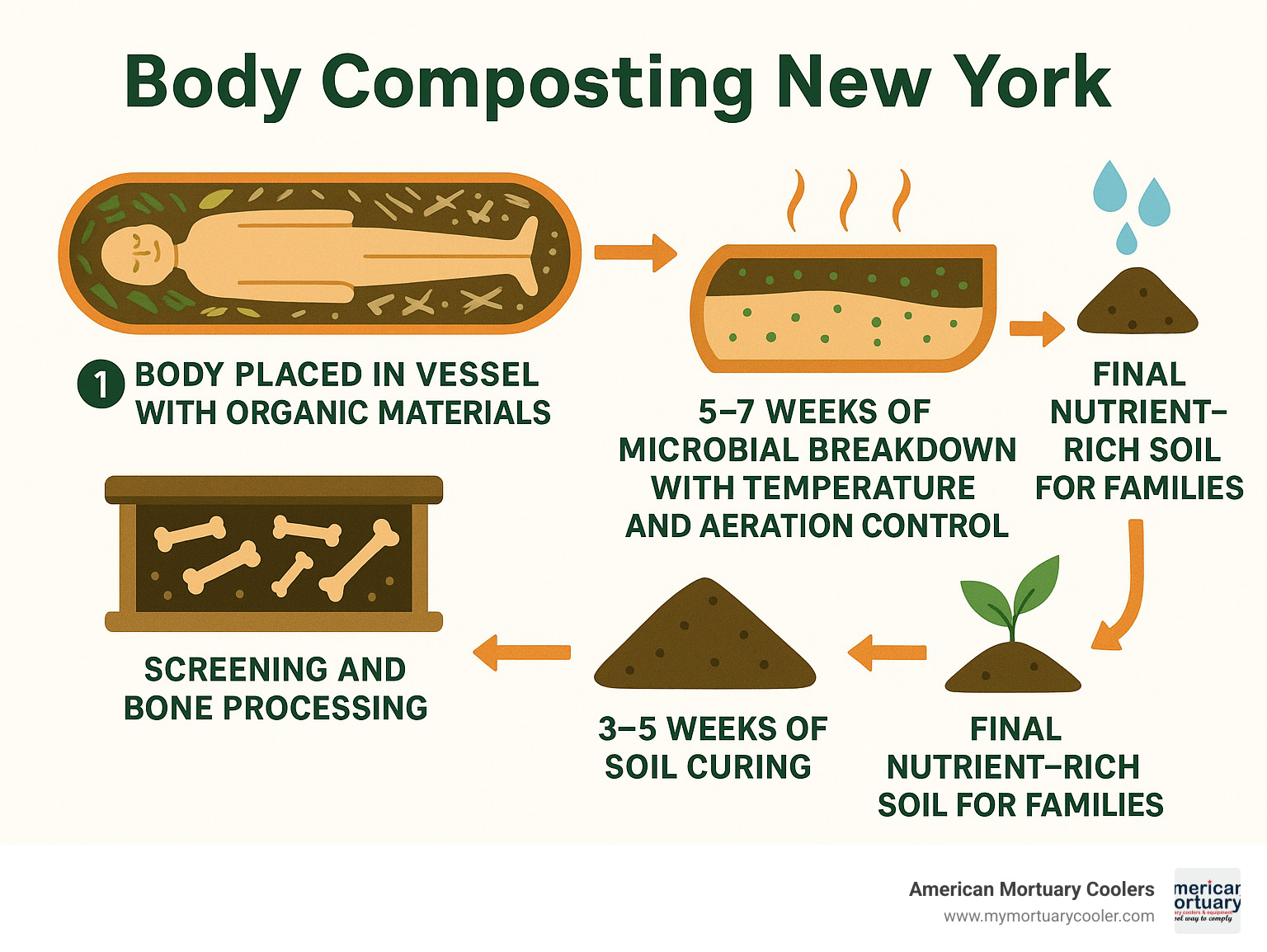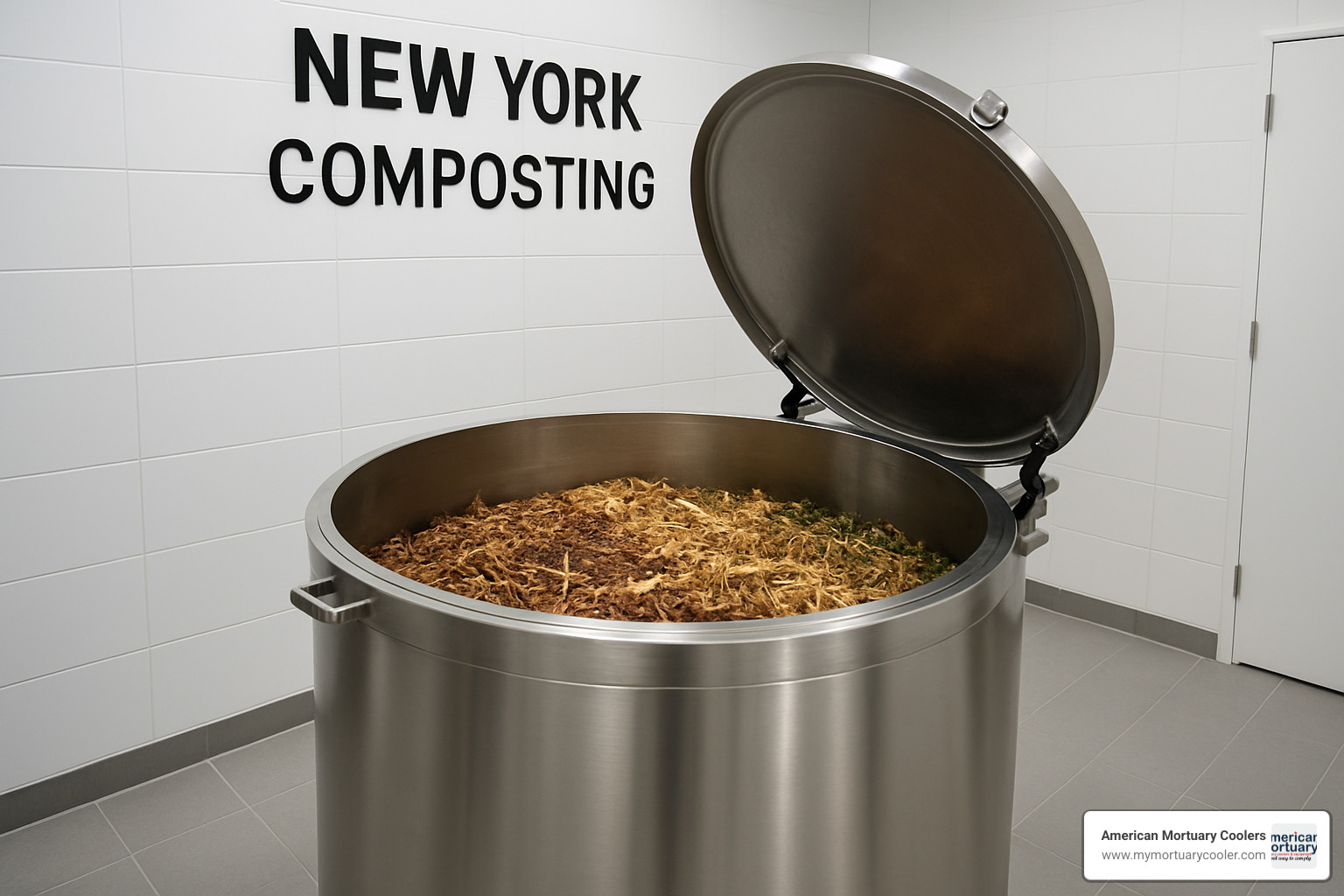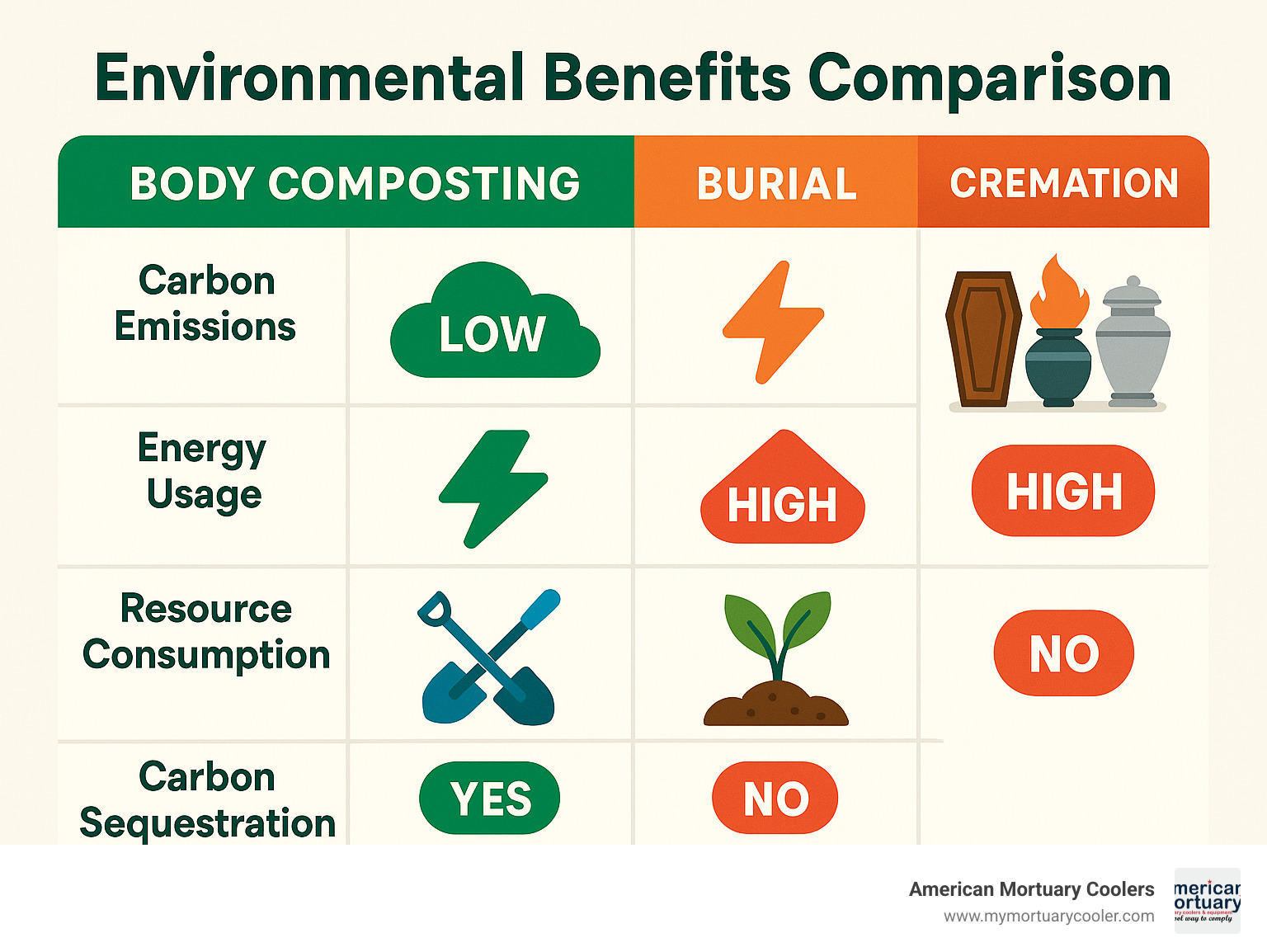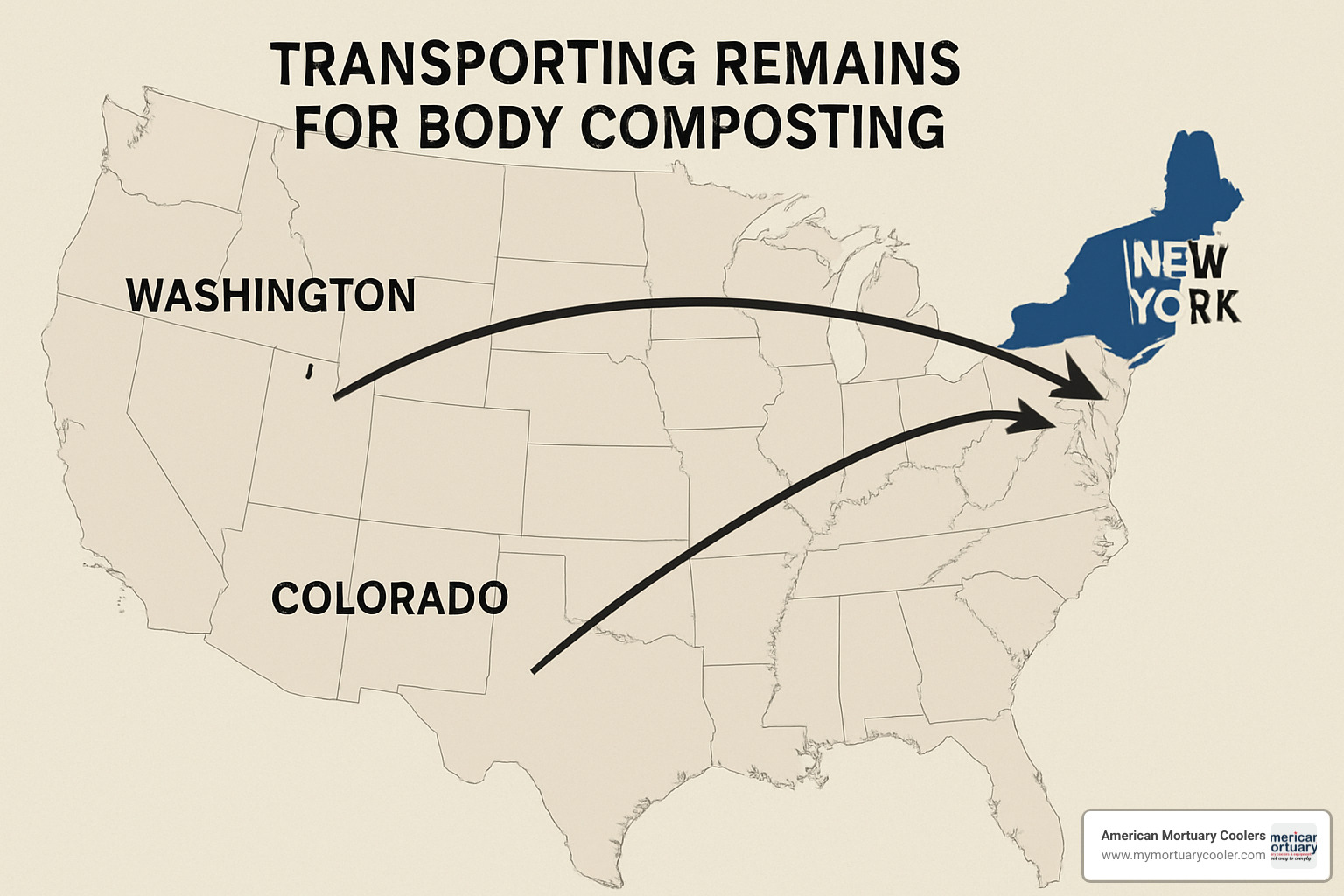
The Definitive Guide to Body Composting Laws in New York
Why Body Composting is Revolutionizing Death Care in New York
Body composting new york has become a reality after Governor Kathy Hochul signed legislation in December 2022, making New York the sixth state to legalize this eco-friendly alternative to burial and cremation. Also known as natural organic reduction or terramation, this process transforms human remains into nutrient-rich soil over 2-3 months.
Quick Facts for New Yorkers:
- Legal Status: Fully legal since December 2022
- Process Time: 2-3 months (5-7 weeks active composting + 3-5 weeks curing)
- Cost: Around $7,000 vs $8,300 burial vs $6,280 cremation
- Environmental Impact: Saves 1 metric ton of CO₂ per body, uses 87% less energy than cremation
- Soil Yield: Approximately 1 cubic yard (1,000 lbs) of pH-balanced soil per body
- Current Facilities: None operating in NY yet - bodies transported to Washington or Colorado
The process works by placing un-embalmed remains in stainless steel vessels with wood chips, alfalfa, and straw. Natural microbes break down the body while temperature and aeration are carefully controlled. After screening out implants and pulverizing bones, families receive nutrient-rich soil perfect for memorial gardens or conservation projects.
"The idea of being turned into compost for my loved ones to grow something from my remains was a beautiful idea," shared one client from the research, highlighting the emotional appeal beyond environmental benefits.
Draft regulations are due by June 28, 2024, with multiple state agencies coordinating oversight. While no facilities operate in New York yet, funeral homes are already partnering with out-of-state providers to serve families seeking this green alternative.
As American Mortuary Coolers with experience in mortuary refrigeration systems, we've seen growing demand for body composting new york services among funeral directors planning for sustainable death care options. Our background in mortuary equipment helps funeral homes understand the refrigeration needs for transporting remains to composting facilities until local options become available.

Current Legal Landscape for Body Composting New York
New York made history in December 2022 when Governor Kathy Hochul signed body composting new york into law, following months of legislative work on Assembly Bill A382 and Senate Bill S5535. This groundbreaking decision made New York the sixth U.S. state to accept natural organic reduction, joining Washington, Colorado, Oregon, Vermont, and California in offering this eco-friendly option.
The law officially kicked in 90 days after signing, but that was just the beginning. The real heavy lifting started with creating the actual rules that facilities need to follow.
Three state agencies are working together to make this happen: the Division of Cemeteries under the Department of State handles facility licensing, the Department of Health sets public health standards, and the Department of Environmental Conservation manages environmental rules and what happens to the soil afterward.
The draft regulations were due June 28, 2024, which will spell out exactly how composting facilities can operate in New York. Interestingly, the law treats these facilities just like cemetery corporations, meaning they follow similar strict rules as crematories, including never mixing different people's remains together.
Not everyone was thrilled about the change. The Catholic Conference of New York spoke out against the bill, arguing that human bodies deserve more reverent treatment than what they saw as a waste disposal process. But supporters pushed back, highlighting both the environmental benefits and the importance of giving families more choices during difficult times.
Is Human Composting Legal in New York? The answer is yes—it's been completely legal since December 2022.
Key Remaining Regulatory Steps
Even though the law exists, several important pieces still need to fall into place before the first facility can open its doors.
Permit fees are pretty straightforward—cemetery corporations pay $3 per natural organic reduction over 15 in the previous year, similar to what they already pay for burials and cremations. The inspection process gives the Cemetery Board 35 days to ask for more information and 90 days total to approve or deny applications.
Soil disposition rules get more complicated than you might expect. Unlike cremated remains that families can scatter in many places, composted soil has specific guidelines about how families can use and transport it. Employee certification requirements mean staff need to complete Board-approved training programs every five years, just like crematory operators do.
Perhaps the trickiest piece is municipal zoning. Local communities need to update their zoning laws to make room for composting facilities, which can be especially challenging in crowded urban areas where every square foot of land matters.
Religious & Ethical Perspectives
The religious community's response to body composting new york has been all over the map. Catholic bishops have expressed strong concerns, emphasizing traditional beliefs about treating human remains with dignity and respecting the body's role in resurrection theology.
Jewish perspectives vary quite a bit—some Orthodox authorities have reservations while Reform communities tend to be more open to considering environmental factors. Islamic views generally favor quick burial without chemical preservation, which actually makes natural organic reduction potentially compatible with some interpretations, since it avoids embalming.
Secular ethics strongly support the practice, with environmental philosophers arguing that returning nutrients to the earth fits perfectly with natural cycles and our responsibility to address climate change. As one person shared in our research, choosing composting reflects an ethic of "doing no harm and perhaps doing some good."
Cultural acceptance keeps growing, especially among environmentally conscious New Yorkers who see composting as a meaningful way to keep contributing to conservation even after death. It's becoming less about religious doctrine and more about personal values and environmental stewardship.
How the Process Works & Timeline

The body composting new york process follows a carefully controlled scientific method. Un-embalmed remains are placed in custom stainless steel vessels along with a precise mixture of wood chips, alfalfa, and straw. This combination provides the optimal carbon-to-nitrogen ratio for microbial activity.
The vessels maintain specific temperature, moisture, and oxygen levels while naturally occurring microbes break down organic matter. Unlike some facilities that use mechanical rotation, leading providers like Return Home use a passive process without constant vessel movement, creating what they describe as a more peaceful environment.
Temperature monitoring ensures the process reaches pathogen-killing levels while preventing overheating. Aeration systems provide necessary oxygen while filtering exhaust to control odors - a crucial consideration for urban facilities.
After the active composting phase, non-organic materials like implants are carefully screened out and recycled when possible. Bones and teeth, which resist full breakdown due to their mineral composition, are mechanically reduced to powder and reintroduced to balance nutrients in the final soil.
More info about human composting vessels
Body Composting New York: Process Timeline
The complete body composting new york timeline spans 2-3 months:
Weeks 1-7: Active Composting Phase
- Body placed in vessel with organic materials
- Microbial breakdown accelerates
- Temperature reaches 131-160°F to eliminate pathogens
- Regular monitoring of moisture, oxygen, and pH levels
Weeks 8-12: Curing Phase
- Soil removed from vessel and screened
- Implants separated and recycled
- Bones pulverized and reintegrated
- Material rests and stabilizes for 2-4 weeks
Final Product
- Approximately one cubic yard of soil (enough to fill a pickup truck bed)
- Weight: 500-1,000 pounds
- pH: 6.5-7 (ideal for most plants)
- Rich in nitrogen, phosphorus, potassium, and sulfur
Temperature monitoring throughout ensures safety while odor control systems make the process suitable for urban environments. The resulting soil is tested according to state compost regulations before release to families.
Scientific research on emissions reduction shows this process produces significantly fewer greenhouse gases than traditional methods.
Organ Donation Compatibility
One common question about body composting new york is whether organ donation remains possible. The answer is yes - organs can be removed by medical professionals at the time of death, and the body can subsequently undergo natural organic reduction.
However, coordination is essential. Embalmed bodies cannot be composted, so families choosing both organ donation and composting must work with providers who understand the logistics. Some organs may be preserved temporarily through refrigeration rather than chemical preservation.
We've seen increased demand for mortuary refrigeration systems that can maintain bodies at proper temperatures during the coordination period between organ recovery and transport to composting facilities.
Environmental Impact & Soil's Second Life

When families choose body composting new york, they're making a powerful statement about climate action. Each person who picks human composting over traditional burial or cremation prevents about one metric ton of carbon dioxide from entering our atmosphere. To put that in perspective, that's like taking a car off the road for 2,500 miles of driving.
The energy savings are equally impressive. Human composting uses 87% less energy than cremation, which needs sustained heat over 1,600°F for several hours. Meanwhile, traditional burial carries its own environmental burden through casket manufacturing, concrete vault production, and ongoing cemetery maintenance.
But here's what makes composting truly special - it doesn't just reduce harm, it actively helps. The process sequesters carbon in stable soil rather than releasing it as greenhouse gases. Your loved one literally becomes part of the solution to climate change.
The soil that emerges has a pH between 6.5 and 7 - perfect for most plants. It's rich in nitrogen, phosphorus, potassium, and sulfur. This isn't just any dirt we're talking about. It's premium soil amendment that can bring new life to struggling gardens or help restore damaged ecosystems.
Many families find comfort knowing their loved one will continue nurturing life. One cubic yard of this nutrient-rich soil can support memorial gardens, help establish new forests, or even grow food that feeds future generations.
Comparing burial vs. cremation vs. body composting
| Method | Average Cost | CO₂ Emissions | Energy Use | Land Use | Chemical Impact |
|---|---|---|---|---|---|
| Traditional Burial | $8,300 | High (casket production, vault, maintenance) | Moderate | High (permanent land use) | High (embalming fluids) |
| Cremation | $6,280 | 535 lbs CO₂ | High (3-4 hours at 1,600°F+) | Low | Moderate (mercury emissions) |
| Body Composting | $7,000 | Net negative (carbon sequestration) | 87% less than cremation | Minimal | None |
Using the Soil & Legal Restrictions
Each body composting new york process creates roughly one cubic yard of soil - enough to fill the bed of a pickup truck. That translates to 500-1,000 pounds of nutrient-rich earth that families can use in meaningful ways.
Most families keep some soil for memorial gardens or tree planting on their own property. The rest often goes to conservation projects where it can help restore damaged land or create new habitats for wildlife. Some providers maintain protected woodlands where families can contribute unused soil to ongoing ecosystem restoration efforts.
The legal side is straightforward but important. Families can use the soil in home gardens and landscaping without special permits. They can scatter it on private land with permission or donate it to conservation organizations. However, you can't scatter it in public spaces without proper permits, and some municipalities have specific transport guidelines.
Unlike cremated remains, which many people scatter freely, composted soil follows different rules because it's considered a beneficial soil amendment rather than human remains. This actually opens up more possibilities for meaningful use.
We've seen families create beautiful memorial rose gardens, plant groves of native trees, and even donate soil to community gardens. The soil becomes a living legacy that keeps giving back to the earth for years to come.
More info about green burial options in NY
Access, Providers & Costs for New Yorkers

Right now, choosing body composting new york means looking beyond state lines. No facilities operate within New York yet, so families must work with providers in Washington or Colorado. It's not ideal, but many New Yorkers find the environmental benefits worth the extra logistics.
The good news? Several established companies make the process surprisingly manageable. Return Home in Auburn, Washington operates an award-winning facility with 74 custom vessels and welcomes family visits during the process. Their passive approach avoids mechanical rotation, creating what they call a more peaceful environment.
Recompose in Seattle pioneered the industry and maintains transparent pricing at exactly $7,000. They've built a strong reputation for environmental advocacy and offer pre-planning options that many New Yorkers appreciate.
Earth Funeral serves all 50 states through their online platform, completing the process in 45 days while running entirely on renewable energy. The Human Compost Company has announced plans for upstate New York, though no timeline is confirmed yet.
The average body composting new york cost hovers around $7,000 for the process itself. Transportation adds another $1,000-3,000 depending on your provider and logistics. One family we learned about paid $8,700 total - about twice cremation cost but half what traditional burial runs.
Payment options include direct payment, pre-planning with monthly installments, and some insurance coverage. Community funds help families facing financial hardship access this choice.
More info about human composting options
Choosing Body Composting New York Services
Selecting the right body composting new york provider involves more than just price comparison. The logistics matter enormously when you're coordinating across state lines.
Transportation and coordination become crucial factors. You'll need a local funeral home that partners with out-of-state composting facilities. Proper refrigeration during transport is essential - something we handle regularly at American Mortuary Coolers when funeral homes need temperature-controlled storage during the arrangement process.
Service philosophy varies between providers. Some use passive composting methods while others employ mechanical rotation. Some welcome family involvement and visits, while others maintain more distance. The level of transparency in process updates and pricing also differs significantly.
Practical considerations include total costs with shipping, timeline from death to soil return, and how the provider handles memorial service coordination. Documentation requirements and permit handling can get complex when crossing state lines.
We've worked with funeral homes across New York to ensure proper refrigeration during the coordination phase. Our mortuary coolers maintain optimal temperatures while families arrange out-of-state services and handle the necessary paperwork.
Future NY Facilities & Business Opportunities
Several factors will determine when body composting new york facilities actually open in-state. The regulatory timeline looks promising with draft regulations due June 28, 2024, but licensing and permitting could still take anywhere from six months to several years.
Investment requirements present real challenges. Facilities need specialized vessels, sophisticated aeration systems, screening equipment, and testing capabilities. Initial investment easily reaches hundreds of thousands of dollars - a significant barrier for smaller funeral homes.
Urban land challenges make New York particularly tough. High real estate costs and complex zoning restrictions drive up development expenses compared to other states where composting facilities have opened.
Market demand appears strong, especially in environmentally conscious communities. One funeral director told us that once local options become available, many New Yorkers will choose composting over traditional cremation or burial.
Some funeral homes are exploring retrofit options to add composting capabilities to existing facilities. This requires major HVAC modifications, specialized equipment installation, and extensive staff training - areas where we provide consultation through our mortuary equipment expertise.
The wait for in-state facilities continues, but the groundwork is being laid for New York to join the growing number of states offering this meaningful choice to families.
Frequently Asked Questions about Body Composting in New York
Is body composting legal statewide right now?
Absolutely! Body composting new york became fully legal throughout the state in December 2022 when Governor Kathy Hochul signed the legislation. This makes New York the sixth state in the nation to accept natural organic reduction as a death care option.
Here's the catch though - while it's completely legal, you can't actually get it done in New York yet. No facilities are operating within state borders, so families need to work with providers in Washington or Colorado and arrange transportation.
The state agencies are still finalizing the detailed regulations that will govern how facilities operate. Once those rules are in place and approved, we'll likely see the first New York facilities start opening. Until then, it's a bit like having a driver's license but no car - legal, but requiring some extra steps to make it happen.
How much soil does one body create and can my family keep it all?
The body composting new york process creates about one cubic yard of rich, fertile soil. Picture a 3-foot by 3-foot by 3-foot cube - that's roughly enough to fill a pickup truck bed. The soil weighs between 500 and 1,000 pounds, so it's substantial.
Your family can absolutely keep all of it if you want. The soil has a pH of 6.5-7, which is perfect for most plants and gardens. Many families find this amount is more than they need for memorial plantings, so they often keep a portion for special memorial trees or gardens and donate the rest to conservation projects.
Some families get creative with smaller amounts too. They might keep a few containers of soil for houseplants or small memorial gardens while using the bulk for larger projects like memorial groves or supporting land restoration efforts. The soil is genuinely valuable - it's not just dirt, but nutrient-rich amendment that can help forests and gardens thrive.
Can I pre-pay or include body composting in my will?
Yes, you can definitely plan ahead for body composting new york! Most providers offer pre-planning programs that let you arrange and pay for services in advance. Companies like Recompose have monthly payment plans through their "Precompose" program, while others accept full advance payment with guaranteed pricing.
Including your wishes in your will is smart, but pre-arrangements with providers work better for the practical stuff. Wills sometimes aren't read until after funeral arrangements are made, and the logistics of transporting remains to out-of-state facilities require advance coordination.
Pre-planning also locks in today's pricing, which is around $7,000 currently. As demand grows and more facilities open, prices could increase. Compare that to $8,300 for traditional burial and $6,280 for cremation, and you can see why many people want to secure current rates.
Make sure your family knows about your arrangements and has contact information for your chosen provider. As funeral professionals, we've seen how much easier it makes things when families know exactly what their loved one wanted and have the practical details already sorted out.
Conclusion
Body composting new york represents more than just another funeral option—it's a fundamental shift toward death care that gives back to the earth. After decades of practices that consume resources and release emissions, New Yorkers now have a legal pathway to transform their final act into one of environmental healing.
The numbers tell a compelling story. Each person choosing human composting prevents one metric ton of CO₂ from entering our atmosphere while creating nutrient-rich soil that can nourish memorial gardens, support reforestation, or help restore conservation land. At around $7,000, it's competitively priced between cremation and burial, but the value extends far beyond cost.
What makes body composting new york particularly meaningful is how it aligns with how many people want to live—and leave—their mark on the world. Instead of taking up permanent cemetery space or releasing emissions through cremation, families can watch their loved one's legacy literally grow in the form of thriving trees, gardens, and restored landscapes.
While we wait for in-state facilities to open following the completion of draft regulations, New Yorkers aren't left without options. Established providers in Washington and Colorado are already serving families across the country, including right here in New York. The logistics require coordination, but the process is well-established and professionally managed.
As facilities prepare to open in New York, funeral homes are upgrading their infrastructure to support this growing demand. At American Mortuary Coolers, we've seen how funeral directors are planning for the future of sustainable death care. Our mortuary refrigeration systems play a crucial role in maintaining proper preservation during the coordination and transport phases, ensuring families who choose body composting new york receive the professional care they deserve.
The change happening in death care reflects broader changes in how we think about our relationship with the environment. Body composting offers a way to make our final contribution one of regeneration rather than depletion. It's death care that nurtures life.
Whether you're a funeral director preparing for tomorrow's services or a family exploring meaningful end-of-life options, human composting provides a path that honors both the person who died and the world they leave behind. As this movement continues growing across New York, we're proud to support the infrastructure that makes these deeply personal choices possible.
Learn more about advanced death-care equipment and find how American Mortuary Coolers supports sustainable funeral practices across New York and throughout the nation.



